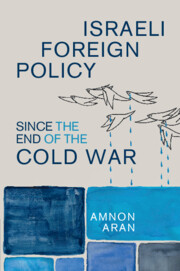Book contents
- Israeli Foreign Policy since the End of the Cold War
- Cambridge Middle East Studies
- Israeli Foreign Policy since the End of the Cold War
- Copyright page
- Dedication
- Contents
- Maps
- Figures
- Acknowledgements
- Chronology
- Abbreviations
- Maps
- Introduction
- 1 Entrenchment
- 2 Redirection
- 3 On the Brink of Peace?
- 4 Engagement Incomplete
- 5 Engagement under Assault
- 6 The Dividends of Engagement
- 7 Unpicking the Oslo Accords
- 8 Backtracking
- 9 Just Beyond Reach
- 10 Between Engagement and Unilateralism
- 11 In Search of a Foreign Policy Paradigm
- 12 A Perfect Storm
- 13 The Road Map for Regime Change
- 14 The Resurgence of Unilateralism
- 15 Events Dear Boy, Events
- 16 The End of the Road
- 17 Vulnerable Ties
- Epilogue: Israel’s Wondrous Decade?
- Appendix List of Persons Interviewed
- References
- Index
- Books in the Series
Epilogue: Israel’s Wondrous Decade?
Published online by Cambridge University Press: 15 December 2020
- Israeli Foreign Policy since the End of the Cold War
- Cambridge Middle East Studies
- Israeli Foreign Policy since the End of the Cold War
- Copyright page
- Dedication
- Contents
- Maps
- Figures
- Acknowledgements
- Chronology
- Abbreviations
- Maps
- Introduction
- 1 Entrenchment
- 2 Redirection
- 3 On the Brink of Peace?
- 4 Engagement Incomplete
- 5 Engagement under Assault
- 6 The Dividends of Engagement
- 7 Unpicking the Oslo Accords
- 8 Backtracking
- 9 Just Beyond Reach
- 10 Between Engagement and Unilateralism
- 11 In Search of a Foreign Policy Paradigm
- 12 A Perfect Storm
- 13 The Road Map for Regime Change
- 14 The Resurgence of Unilateralism
- 15 Events Dear Boy, Events
- 16 The End of the Road
- 17 Vulnerable Ties
- Epilogue: Israel’s Wondrous Decade?
- Appendix List of Persons Interviewed
- References
- Index
- Books in the Series
Summary
The Epilogue accounts for Israeli foreign policy since the return to power of Binyamin Netanyahu in 2009. It focuses on Israel’s response to the Arab uprisings, its conflict with Iran, wars with Hamas, rejection of the peace initiatives presented by the Obama administration, Israel’s emerging covert relations with Arab Gulf countries, and Israel’s endorsement of the 2020 Trump peace plan. The chapter traces and explains the concentration of power within the hands of Binyamin Netanyahu, whose premiership has been the main element of continuity in an otherwise changing decision-making forum. The chapter also accounts for the shift of the centerground of Israeli domestic politics and society to the right, and explores the implications of this change for Israeli foreign policy. The chapter ends with a critical evaluation of why Israel’s foreign policy reverted to entrenchment during the previous decade, 2009-2020, and explores its implications for Israel’s foreign relations.
- Type
- Chapter
- Information
- Israeli Foreign Policy since the End of the Cold War , pp. 387 - 402Publisher: Cambridge University PressPrint publication year: 2020

